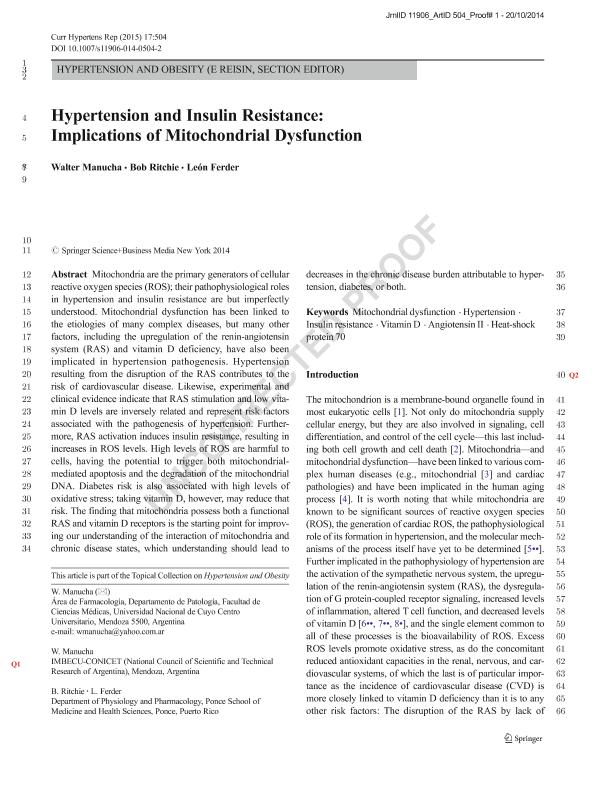Artículo
Hypertension and Insulin Resistance: Implications of Mitochondrial Dysfunction
Fecha de publicación:
11/2014
Editorial:
Springer
Revista:
Current Hypertension Reports
ISSN:
1522-6417
Idioma:
Inglés
Tipo de recurso:
Artículo publicado
Clasificación temática:
Resumen
Mitochondria are the primary generators of cellular reactive oxygen species (ROS); their pathophysiological roles in hypertension and insulin resistance are but imperfectly understood. Mitochondrial dysfunction has been linked to the etiologies of many complex diseases, but many other factors, including the upregulation of the renin-angiotensin system (RAS) and vitamin D deficiency, have also been implicated in hypertension pathogenesis. Hypertension resulting from the disruption of the RAS contributes to the risk of cardiovascular disease. Likewise, experimental and clinical evidence indicate that RAS stimulation and low vitamin D levels are inversely related and represent risk factors associated with the pathogenesis of hypertension. Furthermore, RAS activation induces insulin resistance, resulting in increases in ROS levels. High levels of ROS are harmful to cells, having the potential to trigger both mitochondrial-mediated apoptosis and the degradation of the mitochondrial DNA. Diabetes risk is also associated with high levels of oxidative stress; taking vitamin D, however, may reduce that risk. The finding that mitochondria possess both a functional RAS and vitamin D receptors is the starting point for improving our understanding of the interaction of mitochondria and chronic disease states, which understanding should lead to decreases in the chronic disease burden attributable to hypertension, diabetes, or both.
Archivos asociados
Licencia
Identificadores
Colecciones
Articulos(IMBECU)
Articulos de INST. DE MEDICINA Y BIO. EXP. DE CUYO
Articulos de INST. DE MEDICINA Y BIO. EXP. DE CUYO
Citación
Manucha, Walter Ariel Fernando; Ritchie, Bob; Ferder, León; Hypertension and Insulin Resistance: Implications of Mitochondrial Dysfunction; Springer; Current Hypertension Reports; 17; 1; 11-2014; 1-7
Compartir
Altmétricas




